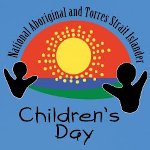National Aboriginal and Torres Strait Islander Children’s Day in Australia Date in the current year: August 4, 2026
 National Aboriginal and Torres Strait Islander Children’s Day (NIACD), also referred to as simply Children’s Day, is observed in Australia annually on August 4. It was established in 1988 to highlight the role of family, community, culture, and language in the lives of Aboriginal and Torres Strait Islander children.
National Aboriginal and Torres Strait Islander Children’s Day (NIACD), also referred to as simply Children’s Day, is observed in Australia annually on August 4. It was established in 1988 to highlight the role of family, community, culture, and language in the lives of Aboriginal and Torres Strait Islander children.In Australia, there are two big groups of Indigenous peoples — Aboriginal Australians and Torrent Straight Islanders. Although the Torres Straight Islands are part of Queensland, their indigenous peoples are ethnically distinct from Aboriginal Australians and culturally distinct from neighboring island peoples.
National Aboriginal and Torres Strait Islander Children’s Day is observed on August 4 to commemorate the so-called Stolen Generations, also known as Stolen Children. They were the children of Indigenous Australian descent who were forcibly taken from their families between approximately 1909 and 1970. Federal and stage government agencies and church missions removed children from their mothers and placed them in orphanages or white foster homes.
Most children didn’t even know their real birthday because they were taken from their families at a very young age, so their birthdays would be communally celebrated on August 4. The Secretariat of National Aboriginal and Islander Child Care (SNAICC) choose this date for Children’s Day to raise awareness of the issues that impact Indigenous Australian children and their families.
For example, until recently, the government of Queensland did not recognize traditional adoptions common in Torrent Straight Islander cultures. This practice, known as kupai omasker, allows children to be adopted by relatives or community members who raise them as their own. Such adoptions are carried out for a variety of reasons, for example, if a couple are unable to conceive or require a male heir.
For a long time, such adoptions were not recognized by Queensland law, which prevented adopted children from taking on their adoptive parents’ last name or even getting a proper birth certificate. The situation finally changed in 2020, when the Queensland Government passed a bill to legally recognize the traditional practice.
And this is just one example of the ongoing challenges that Aboriginal and Torres Straight Islander have to face. Children’s Day helps to raise awareness of the issues such as poverty, discrimination, community disempowerment, forced relocation and loss of land, dislocation from culture, and intergenerational trauma, stemming from the effects of colonization and assimilation. According to the United Nations, indigenous young people across the world experience much higher self-harm and suicide rates compared to other youth.
National Aboriginal and Torres Strait Islander Children’s Day is celebrated with more than 500 community events held across the country, which include activities such as concerts, cultural events, arts and crafts, open days, face painting, storytelling, community barbecues, morning teas, and more.
- Category
- Other Observances
- Country
- Australia
- Tags
- National Aboriginal and Torres Strait Islander Children’s Day, Children’s Day in Australia, observances in Australia, Stolen Generations